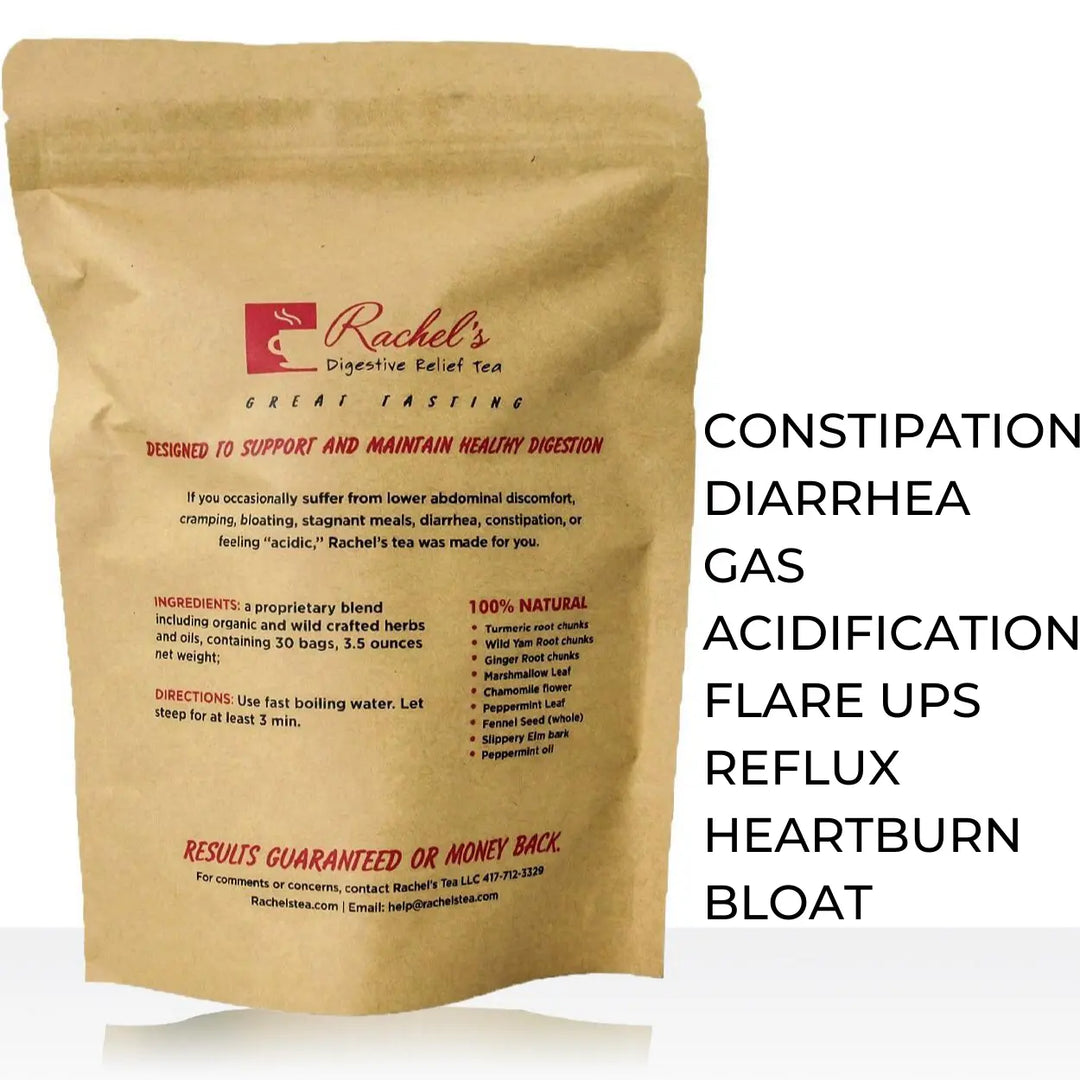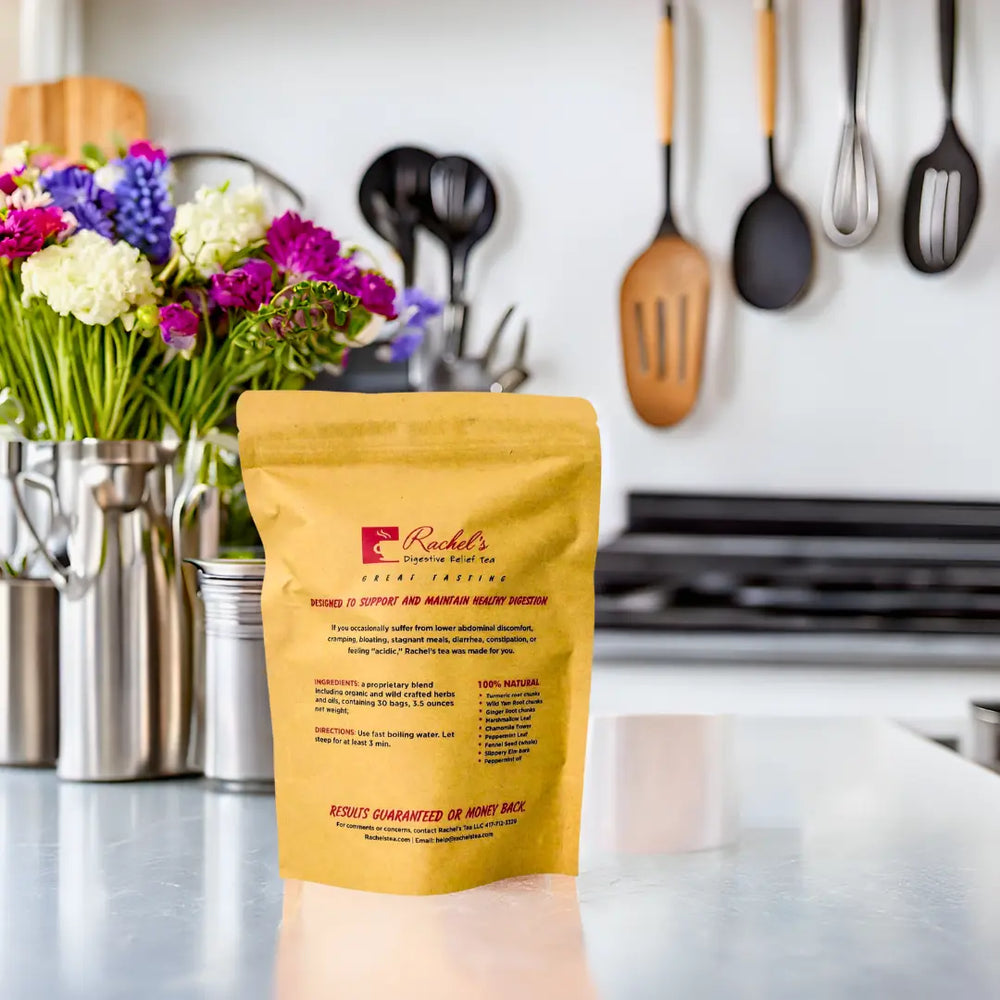3 Herbal Remedies for Constipation and Diarrhea
Constipation and diarrhea are common digestive issues. They can affect our daily life. However, there are several natural and herbal remedies. These traditional remedies are effective and support digestive health. Most of the people seek natural remedies instead of using medication to alleviate these conditions. Let's find out about three natural and herbal remedies to manage constipation and diarrhea. These remedies include digestive tea, slippery elm capsules, and peppermint oil capsules. We'll also discuss when and how to use them safely.
What Is Constipation and Its Causes?

Constipation is defined by infrequent, difficult and painful bowel movements. It refers to having fewer than three bowel movements per week. Its common symptoms are
- hard stools
- Straining
- a sensation of incomplete evacuation
- abdominal pain
- Nausea
- Bloating
Its common causes include:
-
Low-fiber diet: Insufficient intake of fruits, vegetables, and whole grains.
-
Dehydration: Less fluid intake leads to hard stools.
-
Sedentary lifestyle: No physical activity. It affects bowel function.
-
Medications: Certain drugs slow down bowel movements.
- Stress: Emotional stress impacts digestive health.
- Medical conditions: Hypothyroidism and irritable bowel syndrome.
What Is Diarrhea and Its Causes?

Diarrhea involves frequent, loose, or watery stools. It can be acute and chronic. Its common symptoms are
- abdominal cramps
- dehydration
Its main causes include:
-
Infections can be bacterial, viral and parasitic. It affects the intestines.
-
Food intolerances include sensitivity to foods like lactose and gluten.
-
Medications: Some antibiotics and drugs can cause diarrhea.
-
Digestive disorders like irritable bowel syndrome (IBS) can cause diarrhea.
- Stress: I get diarrhea when I am stressed. Emotional stress affects gut function.
Using herbal remedies for constipation and diarrhea

Herbal remedies are a natural approach to digestive discomfort. It has fewer side effects than conventional medications. Many laxatives have herbal ingredients. Some herbs can relieve both constipation and diarrhea.
Digestive Tea
Digestive teas support digestive health. It is beneficial for both constipation and diarrhea. Digestive teas consist of herbs like
- Ginger
- Chamomile
- Peppermint
- Fennel
To know in detail about its ingredients and how it do it. Read, What Is in Digestive Tea for Constipation and Bloating?
These ingredients makes it the best tea for digestion. It is known for its soothing properties. But how digestive tea can help with IBS, bloating & gut health? Its natural ingredients
- reduce bloating
- soothe the digestive tract
- promote regular bowel movements
- alleviate nausea
- promote healthy digestion
- eases discomfort associated with both conditions
It relaxes intestinal muscles. It can relieve constipation and mild diarrhea. To find out best herbal teas, you can also look into 11 Best Herbal Teas for Constipation Relief.
. Slippery Elm
Slippery elm supplements is derived from the inner bark of the Ulmus rubra tree. It has been used to treat many digestive issues. It is a time-tested remedy. It has a gel-like substance called mucilage. It forms a soothing gel. When it is mixed with water. It soothes and coats the digestive tract. It eases irritation due to these digestive issues. It is effective for both
- constipation-by softening stools
- diarrhea-by calming inflammation
Peppermint Oil
Peppermint oil are used to relieve symptoms of
- irritable bowel syndrome (IBS)
- Constipation
- Diarrhea
- Bloating
- Gas
The menthol is present in peppermint oil. It has antispasmodic properties. The enteric-coated peppermint capsules ensure that the oil is released in the intestines. So, it can exert its therapeutic effects. It
- relaxes the intestinal muscles
- reduces spasms
- regulate bowel movements
How to Use These Remedies
-
Digestive Tea: Steep one tea bag. You can take 1-2 teaspoons of loose herbal tea in hot water for 5-10 mins. Drink up to 1–2 cups daily, preferably after meals.
-
Slippery Elm Pills: Follow the dosage recommendations on the product label. Typically, 1–2 capsules are taken 1–3 times daily with water.
- Peppermint Oil Supplements: Take it as directed on the label. Usually, 1–2 capsules are taken 1–3 times daily. Don't use it directly. Look for enteric-coated capsules to avoid heartburn. Avoid taking them simultaneously with antacids.
Always consult your healthcare professional before starting new supplements. If you have underlying health conditions or are taking some medications.
 Natural remedies for constipation and diarrhea
Natural remedies for constipation and diarrhea
In addition to the herbal remedies, natural remedies can also support digestive health:
-
Dietary Fiber: You should incorporate fiber-rich foods into your diet. It includes fruits, vegetables and whole grains. They promote regular bowel movements.
-
Probiotics: Probiotic-rich foods and supplements maintain a healthy balance of gut bacteria.
-
Hydration: Stay hydrated and take adequate fluid intake to prevent dehydration. It can lead to constipation.
-
Regular Exercise: Engage yourself in physical activity to stimulate bowel function.
- Stress Management: Don't take stress, try to manage your stress with relaxation techniques. It can impact digestive health.
To know in detail read: 12 natural remedies to get rid of constipation
When to See a Doctor
Consult a healthcare professional if you experience:
-
Persistent or severe abdominal pain.
-
Blood in stools.
-
Unexplained weight loss.
-
Symptoms lasting more than a few days.
Herbal remedies are safe for mild constipation and diarrhea. But its occasional symptoms need medical attention. If you experience:
- Severe or persistent abdominal pain
- Blood in stools
- Unintentional weight loss
- Symptoms lasting longer than two weeks
- Frequent episodes of constipation or diarrhea.
- Signs of dehydration (dizziness, dry mouth and reduced urination)
Read more:
- Can Probiotics Be Used for Constipation, Diarrhea and IBS?
- Best Digestive Teas for Bloating, Indigestion, and Gut Health
Conclusion
Herbal remedies like digestive tea, slippery elm capsules, and peppermint oil capsules are a natural relief for constipation and diarrhea. By understanding the causes and using remedies wisely, one can get over these digestive issues. Incorporating these remedies, along with lifestyle modifications can support overall digestive health. These lifestyle changes include a balanced diet, regular exercise, and stress management. Always consult with a healthcare professional before starting any new treatment. Especially if you have underlying health conditions and are taking other medications.












